“Find your writing voice.” Maybe you’ve heard this advice before as a way to make your writing stand out and powerfully resonate for your readers. Yet, voice can be such an elusive thing—how can you uncover, discover or find your writing voice?
First, I suggest you consider both your audience and topic. What would help make the book work for your audience? With a self help book, is there anything getting in the way of your readers benefiting in the book—a problem that voice can address?
For example, since readers of The Ultimate Guide to Transforming Anger were likely to feel intimidated—and maybe even put off—by the very idea of dealing with anger, my co-authors and I went for a somewhat playful voice that engaged our readers’ creativity, to counterbalance the challenges of the subject for many readers.
However, even though your voice may vary from one book or audience to another, it’s important that your voice be authentic. Many of the authors I work with are doctors, therapists, coaches or consultants. I invite them—and you—to imagine writing or speaking to a particular client or patient. This makes it easy to tap into your natural, authentic voice—and to capture some of your personality—which will help the book resonate more deeply for readers, and give your writing a unique feel.
A third tip I offer authors is to think about the qualities that attract clients, friends and others to work with you or spend time with you. How can you play up these qualities with your writing voice?
I’ve asked some of my clients to share how they found—and continue to access—their unique writing voice.
7 Authors Share Their Tips to Find Your Writing Voice
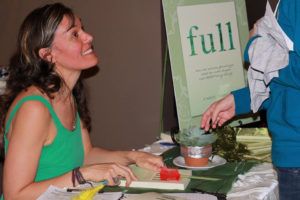 Kimber Simpkins, Author of the Nautilus Award-Winning Book, Full: How one woman found yoga, eased her inner hunger, and started loving herself (pub date March 2015 with New Harbinger Publications) offers this tip:
Kimber Simpkins, Author of the Nautilus Award-Winning Book, Full: How one woman found yoga, eased her inner hunger, and started loving herself (pub date March 2015 with New Harbinger Publications) offers this tip: 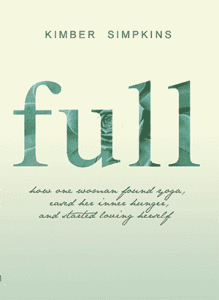 Light, Red Light, Green Light: Read tons of books, find authors whose voices are similar to yours, then stop reading while you write! In writing my book, I took a long sabbatical from reading other writers’ work in order to turn the volume up on my own unique voice.
Light, Red Light, Green Light: Read tons of books, find authors whose voices are similar to yours, then stop reading while you write! In writing my book, I took a long sabbatical from reading other writers’ work in order to turn the volume up on my own unique voice.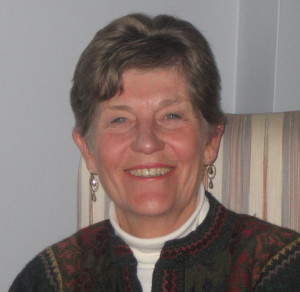
Nora Hall shares, “Finding my voice for Survive Your Husband’s Retirement came surprisingly easily. As I wrote, I pictured myself talking to a woman with a retired husband—a woman I had interviewed—and hearing her pain, surprise and even laughter at the irony of the situations. I merely parroted the emotions of the women I interviewed as I wrote their stories. 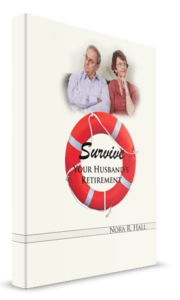
My next project is documenting the Retirement Shock almost everyone faces when retiring. That is going to require a voice I have not yet identified, but I expect, again, to incorporate the voices of those I interview.”
 Harrine Freeman, CEO and owner of H.E. Freeman Enterprises and author of How to Get Out of Debt: Get an A Credit Rating for Free, provides a way to find your natural voice and to use it to deal with negative comments:
Harrine Freeman, CEO and owner of H.E. Freeman Enterprises and author of How to Get Out of Debt: Get an A Credit Rating for Free, provides a way to find your natural voice and to use it to deal with negative comments:
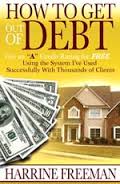 “Speak from your heart. When you speak from your heart you will connect with others. Speak the truth. The truth may not be liked but it is respected. You may get some negative comments but it is a great feeling to know that you were honest and showed integrity.”
“Speak from your heart. When you speak from your heart you will connect with others. Speak the truth. The truth may not be liked but it is respected. You may get some negative comments but it is a great feeling to know that you were honest and showed integrity.”
 Wendy Howard, Author of the hot-off-the-presses book, The 7 Business Angels You Need to Meet, offers this advice:
Wendy Howard, Author of the hot-off-the-presses book, The 7 Business Angels You Need to Meet, offers this advice:
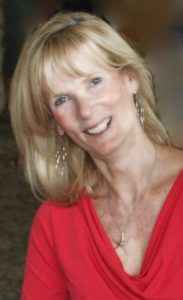
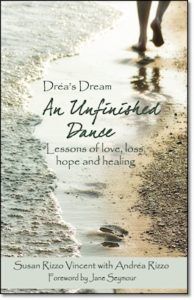 Susan Rizzo Vincent, author of Dreas’ Dream: An Unfinished Dance, shares, “Reading my pieces out loud (in private) and pretending I was talking to a good friend on the phone helped me to find my voice. I tried to imagine what would hold my friend’s attention – and also make my friend feel as though I was confiding in her.
Susan Rizzo Vincent, author of Dreas’ Dream: An Unfinished Dance, shares, “Reading my pieces out loud (in private) and pretending I was talking to a good friend on the phone helped me to find my voice. I tried to imagine what would hold my friend’s attention – and also make my friend feel as though I was confiding in her.
Bruce Dow, MD is a psychiatrist. Like many of the doctors and therapists I work with, his writing exhibited a fairly academic quality—fine for academics but not ideal for a more general audience, in his case, people suffering from PTSD nightmares.
In writing Dream Therapy for PTSD: The Proven System for Ending Your Nightmares and Recovering from Trauma, Bruce had to overcome the academic voice and get back in touch with the voice of the English Major he’d been in his college days–only now more mature and experienced.
 Bruce said, “Before I became a writer, I was a scientist and then a clinician. In writing a scientific or clinical article, you make a tightly reasoned argument to support a claim. You describe observations that justify a conclusion or clinical treatment.
Bruce said, “Before I became a writer, I was a scientist and then a clinician. In writing a scientific or clinical article, you make a tightly reasoned argument to support a claim. You describe observations that justify a conclusion or clinical treatment.
“In writing about my patients for the general public, I had to become a story teller, helping the reader imagine and relate to some people I know very well. I had to bring each person to life for the reader.
“Now, as I read over my manuscript after many revisions, I can see it taking on more of a relaxed conversational tone. The reader and I are out for a stroll through the woods, and I am telling a story about my patient.”
I especially love the image Bruce provides when discussing voice—a good example of what he’s learned to do so well!

One author’s search for voice especially stands out for me. Martha Rhodes came to my Bring Your Book to Life® Book-Writing Program several years ago. Despite her subject’s difficult nature (depression), she managed to have us laughing from the very first time she shared her writing. Clearly, humor was part of her voice from the start. Her observation of detail was superb as well. Yet, what seemed to be missing from the first few pieces she read was an intimate sense of the author.
I sensed that Martha needed to ease into that. She wrote a layer at a time. After the first draft, she could return to earlier chapters and provide more of a sense of the inner landscape she traversed. It worked. Her book, 3,000 Pulses Later: A Memoir of Surviving Depression Without Medication, is in its third printing. There are almost 3,000 copies circulating throughout the world. It has been cited in The New York Times, Psychology Today, and on all social media channels.
 I asked Martha to share her advice on finding one’s voice. Martha said, “Since I’d never written a book before, much less a deeply personal memoir, finding my voice was almost a mystery to me. I didn’t even know I had one, or was supposed to have one. However, I admired Mary Karr’s and Jeannette Walls’ work as memoirists and relished how their voices resonated for me as a reader, so I shamelessly strove to emulate the familiarity, authenticity, and cinematic qualities they so beautifully conveyed. They became my virtual mentors.
I asked Martha to share her advice on finding one’s voice. Martha said, “Since I’d never written a book before, much less a deeply personal memoir, finding my voice was almost a mystery to me. I didn’t even know I had one, or was supposed to have one. However, I admired Mary Karr’s and Jeannette Walls’ work as memoirists and relished how their voices resonated for me as a reader, so I shamelessly strove to emulate the familiarity, authenticity, and cinematic qualities they so beautifully conveyed. They became my virtual mentors.
“Once I hit my own creative stride during the second draft, I noticed that every time I meditated before sitting down at my computer to write, my heart felt more open. The scenes, dialogue and narrative flowed much more freely. Whenever I’d hit a dry spell and meditation didn’t seem to cut it, I’d have a mental conversation with my muse and enlisted Lisa’s ‘Writing in the Zone’ methodology. Then I’d step away, detach myself mentally and emotionally, knowing that my voice would re-emerge stronger and clearer. It always did.”
********************************************************
Interested in exploring your writing voice? Here are three more posts where writers share their tips for: blogging, fiction and nonfiction writing.


